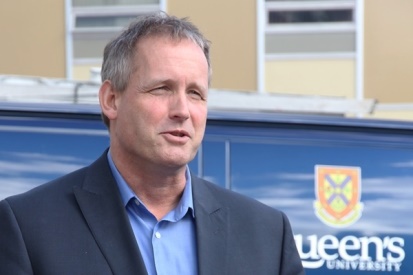The three Rs at Queen's
October 9, 2014
Share

Craig Leroux: With thousands of students, staff and faculty on campus, is there a lot of waste generated at Queen’s?
John Witjes: 3,100 metric tonnes of waste was generated at Queen’s last year, and we successfully diverted 40 per cent of that away from landfills, through programs such as recycling and composting. We want to continually improve these numbers and, like many sustainability and conservation goals, that means raising awareness and changing behaviour.
Most of us are very good at reducing, reusing and recycling at home, and we want to ensure that same commitment translates to the workplace. It's part of Queen's commitment to sustainability and in line with the City of Kingston's vision of being Canada's most sustainable city.
CL: What programs are currently in place to help reach these goals?
JW: First of all, we encourage everyone to reduce the amount of waste they produce. It’s a gradual process and Sustainability Week is one of the many initiatives that our Sustainability Office undertakes to inform the campus community. When waste is produced, we want to keep as much of it as possible out of landfills, and we have active recycling and composting programs to help do that, as well as an e-waste program, a furniture re-use program, scrap metal recycling and a hazardous waste disposal program.
CL: The university recently moved to a centralized waste collection program, rather than collecting garbage and recycling from individual employee’s workspaces. How will that help reduce waste?
Most of us are very good at reducing, reusing and recycling at home, and we want to ensure that same commitment translates to the workplace.
- John Witjes, Associate Vice-Principal (Facilities)
JW: Again, it’s about changing behaviour and attitudes. Just because garbage and recycling is no longer collected right at your desk doesn’t necessarily mean an immediate, significant reduction of waste. But it is one step in the process of creating a campus culture of waste reduction, along with our other awareness-raising efforts. Other organizations, including universities and the federal government, have adopted similar programs.
CL: I also understand that PPS is no longer providing liner bags for individual waste bins. Is that simply a cost savings measure?
JW: No, the money saved is relatively small. It’s about creating a culture on campus that is committed to waste reduction. In fact, the garbage liner at your desk should not have to be changed very often if you simply empty your trash into the central bins. Food waste should always go directly into compost bins, if available, or into a central bin or one in a kitchen area.
CL: Do you have any tips for people who’d like to reduce waste at work?
JW: There are many good tips on the sustainability website, such as packing waste-free lunches, ensuring all recyclables go in the proper recycling bin, only printing when absolutely necessary, buying recycled toner cartridges, and signing up your department for our organics composting program. These are examples of small changes in our routines that can make a big impact in reducing waste at Queen’s.